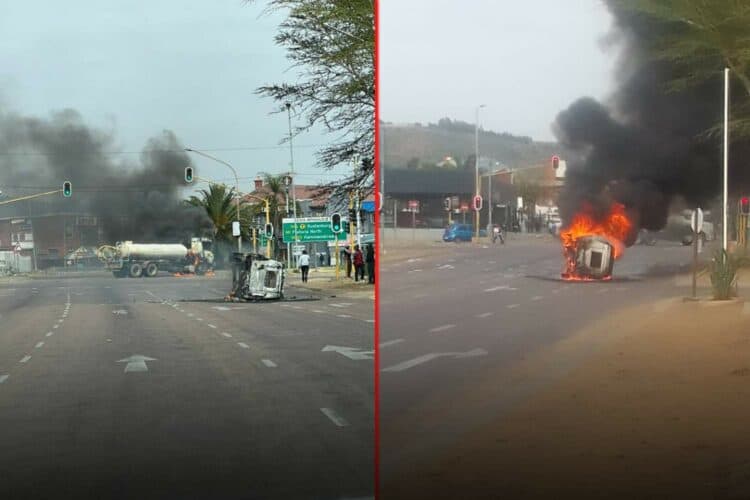Chaos erupted in certain areas of Tshwane CBD on Wednesday, 13 September 2023, as unidentified groups launched violent attacks on municipal vehicles.
Who is behind the chaos unfolding in Tshwane CBD?
PLEASE NOTE: The third-party content below is shared on our platform for journalistic purposes. Swisher Post, its parent company, partners and affiliates shall not be held liable for any consequence that arises from the journalistic duties performed in sharing this content.
Eyewitnesses captured footage of the unsettling scenes as several municipal vehicles were engulfed in flames, leaving onlookers horrified.
More footage @CilliersB https://t.co/iyhixCYz2t pic.twitter.com/y2cWLma8LQ
— Jabulani Mnisi (@BraJabu1) September 13, 2023
Pretoria – Burning Municipal Vehicles on the western side of the CBD area (Kgosi Mampuru corridor) pic.twitter.com/x8sEi3yzPn
— TrafficSA (@TrafficSA) September 13, 2023
As this article was published, specific details about the incident remained scarce. The exact nature of the violence and the identity of the groups behind the attacks were not definitively confirmed.
Murmurs link SAMWU to the Tshwane unrest
However, there have been murmurings suggesting that the South African Municipal Workers Union (SAMWU) might be linked to the violence.
SAMWU has been embroiled in a dispute with the DA-led metro over a 5.4% wage increase for municipal employees. Workers claim they have not received a salary increase for the past three years.
The wage dispute has been ongoing for seven weeks, during which workers have been on strike.
Mayor Cilliers Brink has cited financial constraints as the reason for being unable to meet the demands for salary increases and has applied to the SA Local Bargaining Council for an exemption.
However, the City’s bid to be exempted from paying increases to workers was recently rejected.
SAMWU’s General Secretary, Dumisane Magagula, countered the DA’s claim of a lack of funds to pay salary increases.
He accused the DA of making political decisions, stating that the decision not to pay workers their salary increases came from the upper echelons of the DA.
Magagula pointed to budgetary figures, asserting that the City had a surplus of over R1 billion in the last financial year and that the required amount to fulfil the collective agreement was only R601 million.
He deemed these figures evidence that contradicted the excuse of a lack of resources.
In response to the bargaining council’s decision, the municipality announced its intention to seek a review of the decision in the Labour Court.
This move signals that the wage dispute remains unresolved and could potentially lead to further tensions.






